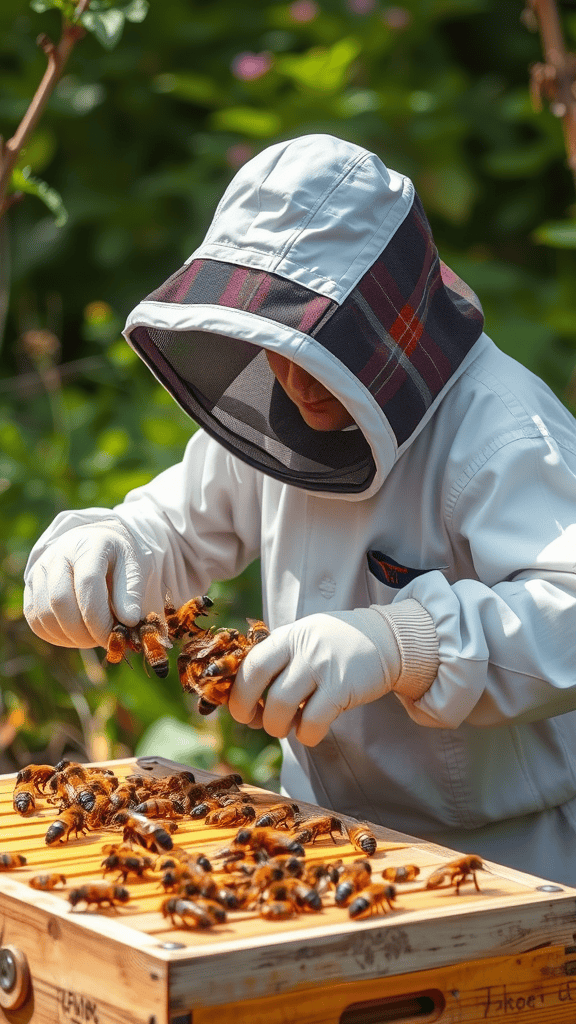Understanding Natural Beekeeping: Principles and Practices
Natural beekeeping is an approach that echoes the principles of sustainability and ecological integrity while promoting the well-being of bee populations. If you’re interested in the world of bees and how to keep them more harmoniously, it’s essential to understand what natural beekeeping is all about and the core practices that define this gentle method of apiculture.
At its core, natural beekeeping prioritizes the health of bees over maximizing honey production. This means embracing nature’s way of supporting these remarkable insects. Here are some key principles that embody natural beekeeping:
- Respect for Bee Autonomy: Natural beekeeping allows bees to exhibit natural behaviors. Beekeepers provide hives that mimic natural habitats, giving bees the freedom to create their own wax structures and manage their colonies.
- Minimal Interference: Rather than constant inspections and manipulations, natural beekeepers strive to let bees thrive with minimal disruptions. This reduces stress on the bees and helps maintain a stable colony.
- Organic Practices: Chemical treatments and synthetic products are avoided. Bees are protected through organic means, such as promoting biodiversity in the surrounding environment to ensure a healthy and balanced ecosystem.
- Focus on Diversity: A diverse environment is essential for healthy bee populations. Natural beekeepers often plant native flora to support foraging and overall hive vitality.
The heart of natural beekeeping lies in creating an environment where bees can flourish naturally. Here are some of the practices that many natural beekeepers employ:
- Top-Bar Hives: These hives are designed for bee welfare, offering a more natural space for bees to build their comb as they please. Top-bar hives make it easier for beekeepers to manage their colonies with minimal disruption.
- Swarm Management: Instead of preventing swarming at all costs, natural beekeeping accepts swarming as a natural process. Beekeepers can capture swarms and create new colonies, encouraging healthy population dynamics.
- Bee Breeding: Natural beekeepers may select bees that are well-adapted to local conditions and resistant to diseases, gradually improving the resilience of their colonies over generations.
- Seasonal Management: Observing the natural cycles of the seasons helps natural beekeepers manage their hives effectively. They monitor bee health according to seasonal changes, allowing the bees to dictate management practices.
Understanding the role of the beekeeper in natural beekeeping can change your perspective on apiculture. The beekeeper acts more as a facilitator than an authority. This hands-off approach means that you are there to support the bees, allowing them to thrive without undue pressure to produce honey.
Natural beekeeping is not just about bees; it’s also about fostering a healthy environment. Local ecosystems benefit when beekeepers choose organic practices and focus on biodiversity. The integration of flowers, shrubs, and trees that attract pollinators enriches the habitat for bees and other wildlife.
One prevalent misconception is that natural beekeeping leads to lower honey yields. While it may not produce the same quantities as conventional beekeeping, the quality of the honey can be superior. Many consumers are drawn to the richer flavors and natural properties of honey produced in this way. Additionally, healthier bees contribute more effectively to the pollination of local plants, benefitting all forms of life in the area.
If you’re considering venturing into natural beekeeping, start slowly. Research local native plants, educate yourself on bee behavior, and perhaps join a community of like-minded beekeepers. Engage with resources, from books to online forums, that provide insights and support. Natural beekeeping is a fulfilling way to connect with nature, contribute to a sustainable environment, and enjoy the unique experiences that come with keeping bees.
In essence, natural beekeeping is a beautiful practice that respects the natural world and promotes the health of bees. By striving for harmony between humans and bees, you can protect these vital pollinators while enjoying the rewards of your labor.
The Benefits of Natural Beekeeping for Bees and the Environment
Natural beekeeping is a method that prioritizes the well-being of bees while also fostering a healthy environment. By utilizing techniques that work in harmony with nature, this practice stands out as a sustainable alternative to conventional beekeeping. Let’s delve deeper into the benefits of natural beekeeping for both the bees and the environment.
Healthier Bees
One of the biggest advantages of natural beekeeping is the promotion of healthier bee colonies. In natural beekeeping, beekeepers allow bees to act as they would in the wild. This means they are provided with space to roam and find their own resources. Here are key points about how this benefits the bees:
- Natural Habitat: Creating an environment that mimics their natural habitat helps bees thrive. They can build their hives as they wish, which reduces stress.
- Disease Resistance: By avoiding chemical treatments, colonies develop stronger resistance to pests and diseases, fostering their immune systems.
- Genetic Diversity: Natural beekeeping encourages genetic diversity among bee populations. This resilience is crucial for their survival.
Environmental Balance
Natural beekeeping not only aids bees but also contributes positively to the environment. Here’s how:
- Pollination: Bees play a vital role in pollinating plants, which supports food production and biodiversity. Healthy bee populations lead to better yields.
- Soil Health: When bees pollinate plants, it helps sustain healthy ecosystems. A diverse plant life promotes better soil structure and nutrient cycling.
- Reduction in Chemical Use: Natural beekeeping minimizes or eliminates the use of synthetic pesticides and herbicides. This reduces environmental pollution and promotes healthier ecosystems.
Improved Honey Quality
Another notable benefit of natural beekeeping is the production of superior honey. Bees that forage naturally on various flowering plants create honey with diverse flavor profiles and higher levels of beneficial nutrients. Here are some aspects of this quality:
- Flavor Diversity: Honey collected from a variety of plants offers interesting flavors and unique characteristics, attracting honey enthusiasts.
- Nutritional Value: Natural honey is often richer in antioxidants and vitamins due to the diverse foraging patterns of bees.
- Raw and Unprocessed: Many natural beekeepers opt to leave honey raw, which preserves its beneficial enzymes and natural properties.
Sustainable Practices
Natural beekeeping aligns closely with sustainable agricultural practices. By focusing on harmony with nature instead of exploiting the bees for maximum production, beekeepers can create a more sustainable model:
- Minimized Human Interference: By allowing bees to thrive with minimal intervention, the natural balance of the ecosystem is maintained.
- Community Engagement: Natural beekeeping fosters a sense of community among beekeepers, farmers, and consumers. This collaboration enhances knowledge sharing about bees and local ecosystems.
- Educational Opportunities: This type of beekeeping can serve as an educational tool, raising awareness about bee conservation and the importance of pollinators in our environment.
Personal Satisfaction
Engaging in natural beekeeping can also provide emotional and psychological benefits. Many people find joy in nurturing the bees and participating directly in ecological preservation.
- Connection to Nature: Beekeeping naturally facilitates a closer relationship with the environment, allowing for mindfulness and appreciation of nature.
- Community Contribution: You become a part of a larger movement promoting sustainable practices while supporting bee populations.
Natural beekeeping represents a meaningful choice for both bees and the environment. By adopting this practice, you can contribute to the health of our pollinators and the ecosystems they support. With benefits that resonate across health, quality, sustainability, and personal fulfillment, natural beekeeping is a commendable path to consider.
Conclusion
Natural beekeeping offers a holistic and respectful approach to managing beehives, emphasizing harmony with nature. By understanding its core principles, beekeepers can create an environment where bees thrive without the interference of harsh chemicals or invasive practices. This mindful method not only prioritizes the health and well-being of the bees but also fosters a resilient ecosystem, making it a sustainable choice for generations to come.
The benefits of natural beekeeping extend far beyond the hive. Healthier bee populations contribute significantly to pollination, which is critical for food production and biodiversity. By choosing natural practices, you play a vital role in supporting the environment, helping to combat declines in bee populations and promote a balanced ecosystem. This, in turn, protects the natural flora and ensures that future generations inherit a world rich in diverse plant life.
As you explore the world of beekeeping, consider adopting these natural practices to both nurture your bees and benefit the Earth. Whether you’re a seasoned apiarist or a curious newcomer, your commitment to natural beekeeping can lead to positive change. It’s not just about honey production; it’s about fostering a connection with your surroundings and contributing to the health of our planet. Each small step you take in natural beekeeping resonates with a larger impact, enhancing your local environment and supporting the vital role bees play in our ecosystems. Embrace this journey, and you’ll find reward not just in your hives but also in the flourishing world around you.
As an Amazon Associate, I earn from qualifying purchases.

